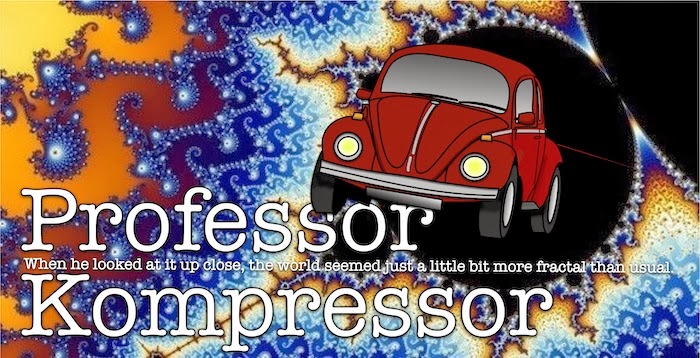Our machinery will be driven by a power
obtainable at any point of the Universe. Throughout space there is energy.
Nikola Tesla 1892
In
case you didn't know this already, Professor Kompressor is an entirely
fictional character. The invention of this excellent inventor was just one of
those things that seem to happen for no apparent reason. A few whimsical
bedtime stories, involving some crazy inventing antics, and the Professor was
off. He was not modelled on a real life character. No way!
Imagine my surprise the other day
when, trying to finish a story intended for the Professor's sequel, I stumbled
upon his real world alter ego. An individual that made such a massive
difference to the world that the genius label is inevitable. The man that
"invented the 20th century", Nikola Tesla. Of course, you think. Jump
on the bandwagon by dragging old Tesla out of the cupboard. How predictable.
Maybe so. But if you are looking for
a role model for the "greatest inventor ever" somewhere in the
borderland between reality and fiction (with the potential of some fun thrown
in for good measure) then Tesla is your man, for sure.
Let's take a look at the evidence.
If it hadn't been for Nikola Tesla's
inventions, the world would have been a very different place. You may not
appreciate it, few people do, but Tesla's ideas laid the foundation for many
things electric and electronic, from the power supply in your house to the TV
remote control and the wireless network you might be using to access the
internet.
Nikola Tesla was born in what is
today Croatia. His imaginative brain was in evidence already when he was a
young man, but his rise to fame did not truly start until he immigrated to the
United States. Pretty much without a penny in his pocket. He found a job as
assistant to Thomas Edison (of obvious lightbulb fame). This turned out not to
be a marriage made in heaven, however, and it was not long before the two
inventors fell out.
The two were soon engaged in an all
out battle for electric supremacy. Tesla's new system emerged as the winner
when it was used to light up the Chicago World's Fair in 1893. His Alternating
Current is still used to bring power to homes around the world today. Following
on from this success, Tesla designed the first hydro power plant at Niagara Falls,
thus bringing practical energy to the people. This idea, to provide everyone
with cheap (or indeed, free!) energy is a key theme of Tesla's career. His
vision ranged from wireless transmission of energy straight into people's homes
and extraction of this energy from medium that surrounds us. Awesome! Of
course, it never happened. Big business was not prepared to support someone
that wanted to simply give the product away. There was too much money to be
made in selling the stuff.
Nikola Tesla can stake a claim to
many other inventions as well. In fact, he was the first to come up with the
lightbulb. Edison was the genius behind the mass market, but the thing itself
was Tesla's idea. He invented the radio. Wasn't that Marconi? you ask. Well,
no. Tesla got there first. This was even recognized by the US Supreme Court in
1943 when they overturned Marconi's patent. X-rays? Yep, Tesla fiddled with
those too. Time to rewrite the history books!
What about the fiction side to this?
Not surprisingly, someone of Tesla's immense creativity provides inspiration
for speculation. He predicted microwaves, TV and interplanetary communication.
It also doesn't hurt that many of his claimed inventions remain
"lost". This involves his death ray, an extension of the wireless
energy idea. Rumour has it that when Tesla died in 1943, alone and destitute in
a New York hotel room, government representatives raided his laboratory and
seized all notes and paraphernalia. None of this material has yet been made
public. Excellent material for a conspiracy theory.
The larger than life character of
Tesla and his amazing ideas have often been called on by authors and moviemakers.
Powerful Tesla coils were used to spectacular effect in The Sorcerer's Apprentice and the inventor himself played a role in The Prestige. Death rays are of
course staple diet of science fiction. How about the main weapon of the Death
Star in the first installment of the Star Wars saga?
Allowing for a slight revision of
history, it is obvious that Professor Kompressor draws on Nikola Tesla in many
ways. Each individual a singular genius with more than a bit of eccentricity to
the character. Their inventions draw on real science but often stretch the
ideas beyond what might seem possible. The Professor's intentions are good and
honourable, just like Tesla's, but things don't always end well. A real
shame, isn't it?
